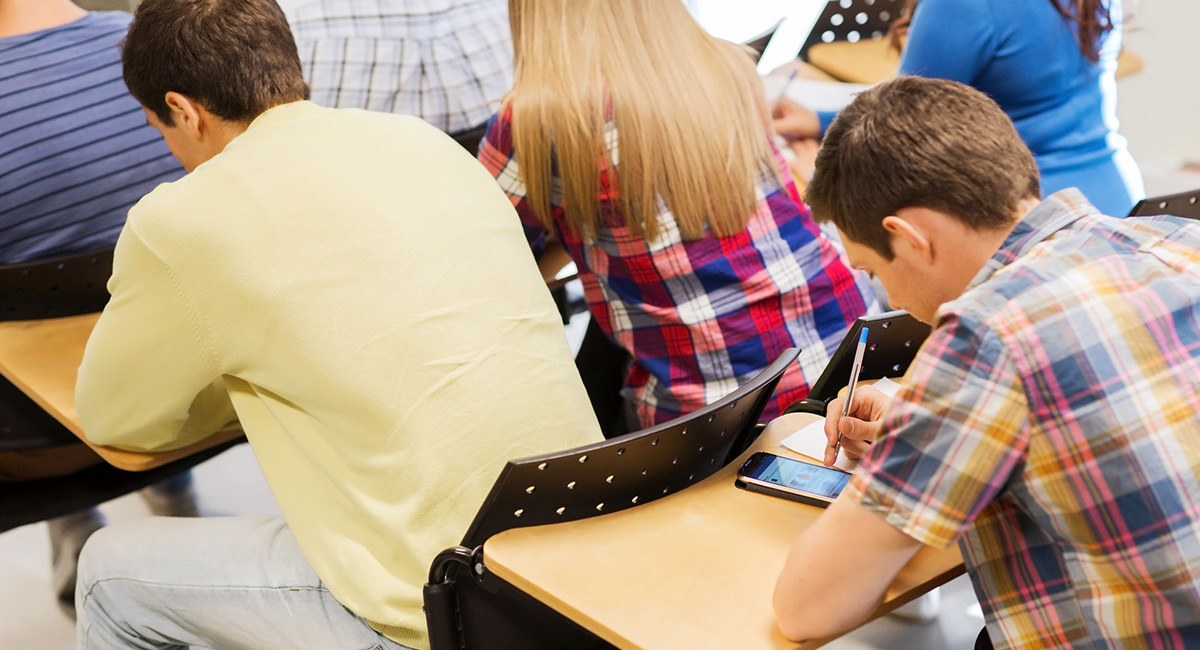Do you want to feel stressed out? Overwhelmed? Like you don’t have enough time in the day? Perpetually uncertain about what, exactly, you’re responsible for, to whom, and by when? Do you wish you could find a simple lifehack that would make it so you feel like you have more time—and more control?
There is: turn your phone off and pay attention.
OK, you don’t have to turn your phone off. Just disable all the pings and rings and dings that call out to you incessantly every time one of your friends posts a new video of a cat doing something amusing to MySpace or Friendster or whatever newfangled thing it is you’re using for the social media these days. However, if you can find ways to seriously and substantially limit the number of things screaming for your attention—especially during class or when you’re studying—you can expect a few things to happen.
First, you’ll catch and retain more the first time around. Do everything you can to turn class time and study time into sanctuaries from the rest of the world. You will be able to accomplish with two hours of focused attention what your distraction-addicted classmates struggle to do in four or five.
Second, you will make fewer mistakes. There are fewer things I find more frustrating than having to go back and redo work I screwed up because I got distracted. Here’s an example. I have been playing a lot of online chess since the Covid-19 pandemic really got underway. I’ve found that the surest way to blunder (and lose) in a timed game is to let myself get distracted by a blinking notification, or an “oh, that reminds me I need to...” thought.
You might think you can multitask. Unless you’re one of a very, very, very small fraction of people in the world, you’re not actually “multitasking.” You’re rapidly switching your attention from one thing to another and chewing up precious cognitive bandwidth every time. Perhaps you’re telling yourself the lie I told myself when I was much younger. However, surreptitiously doing your accounting homework while being dimly aware that you’re in an economics class is not “multitasking.” It’s dividing your attention and making you worse at both tasks.
People have always had distractions, but student, your generation faces a unique challenge in that you carry on your person at pretty much all times a supercomputer that gives you nearly-instantaneous access to pretty much any piece of information our species has ever produced. The Wikipedia rabbit hole awaits. Single girls in your area are waiting to meet you. Literally every episode of The Simpsons is available on Disney+. You might be the millionth visitor to this website. The latest thing Donald Trump said is sure to outrage you. CNN and Fox News and MSNBC and the New York Times want to force-feed you a steady diet of reasons why you should be absolutely terrified right now.
It’s every problem of distraction every previous generation faced, but increased by orders of magnitude. Sticking wax in your ears or simply having your friends tie you to the mast like Odysseus might be impractical, but you can at least quiet the sirens by turning off your automatic notifications when you’re in class or when you sit down to study.
An African proverb says the best time to plant a tree is twenty years ago. The second best time is now. I encourage you, therefore, to get started on the new adventure of guarding your precious time, energy, and attention. Turn your phone off, or at least turn off your auto-notifications. The cat pictures and the Trump tweets will still be there when class is dismissed.









